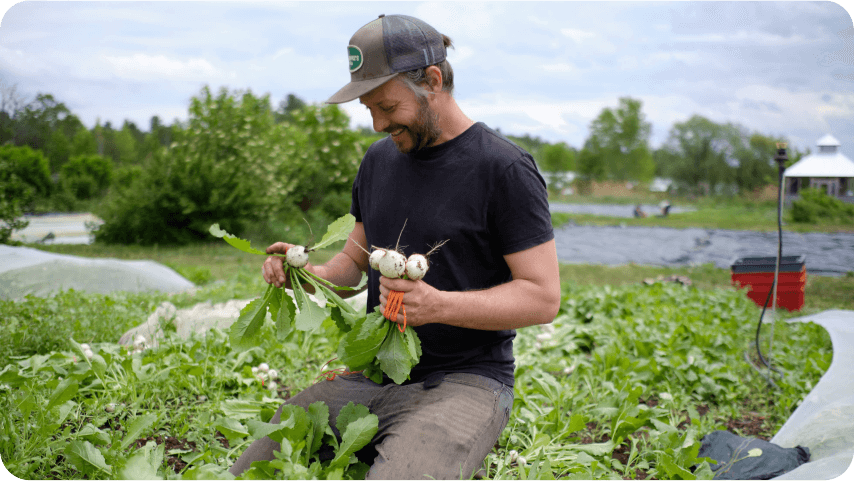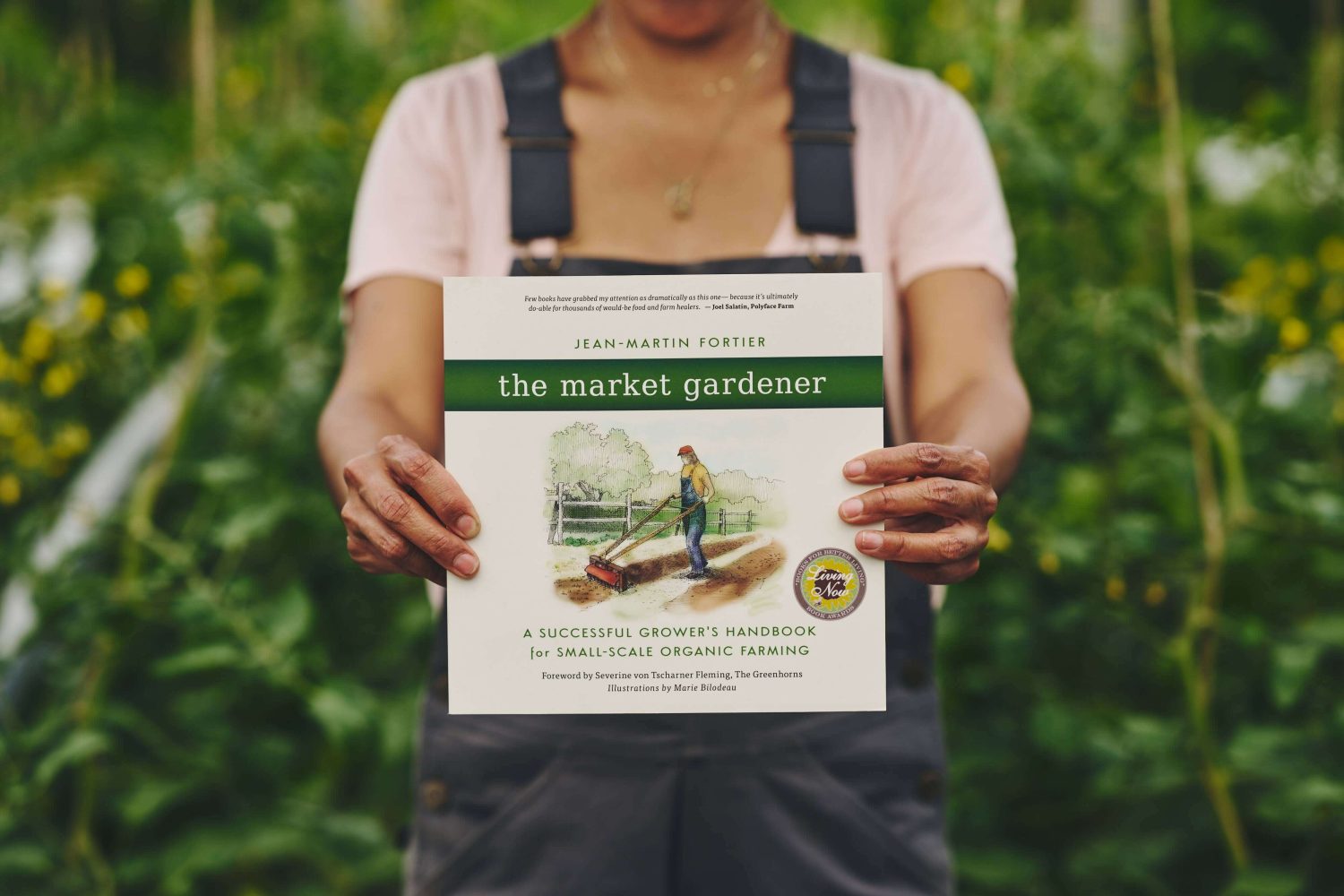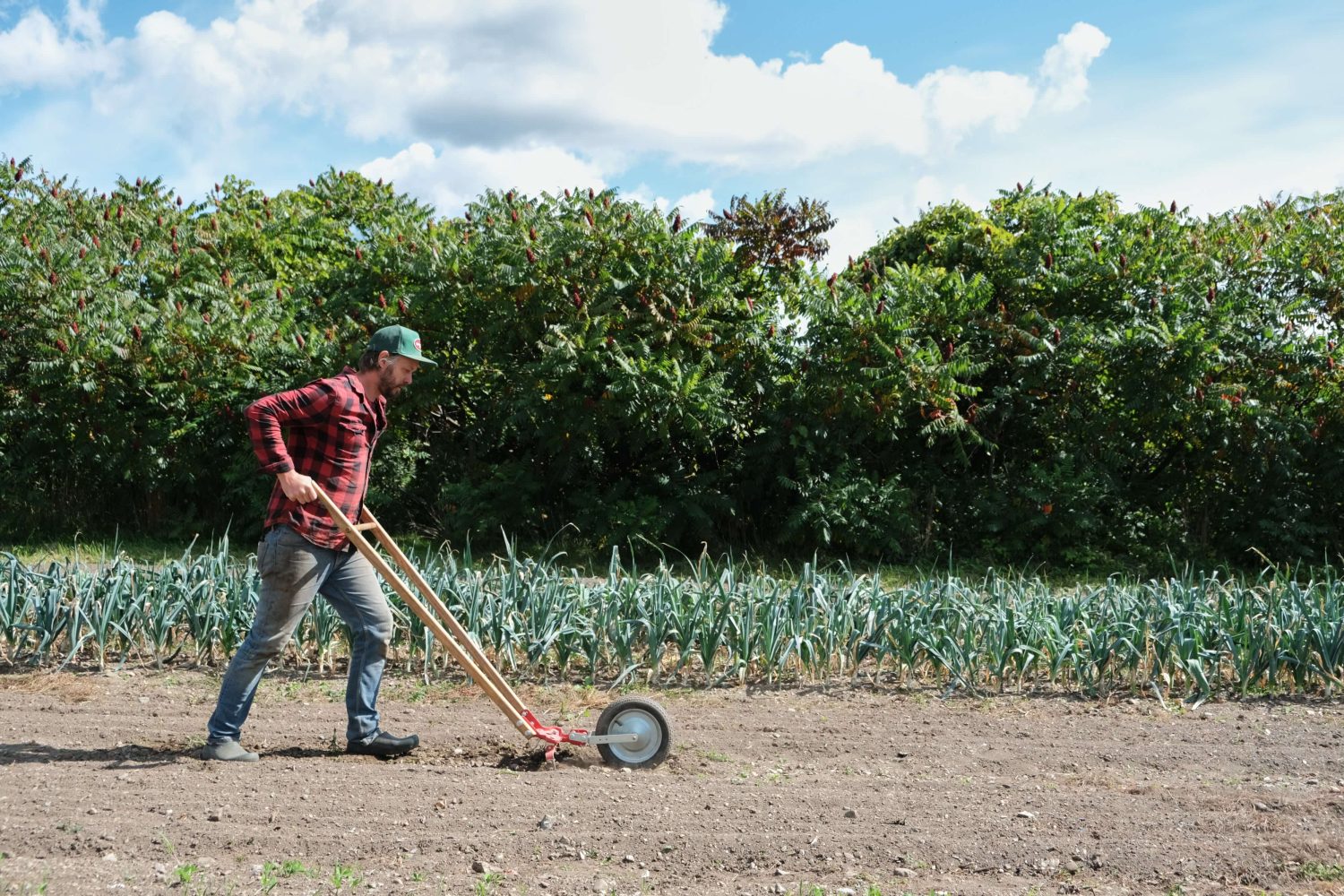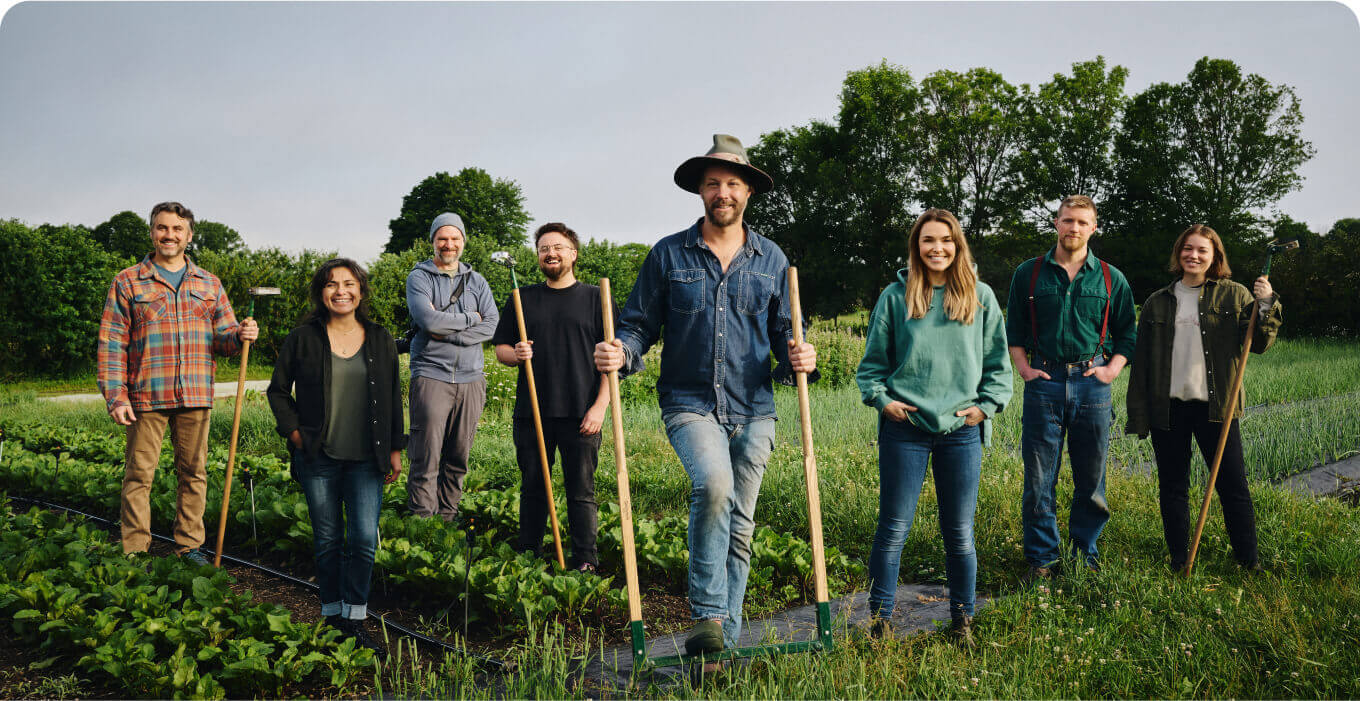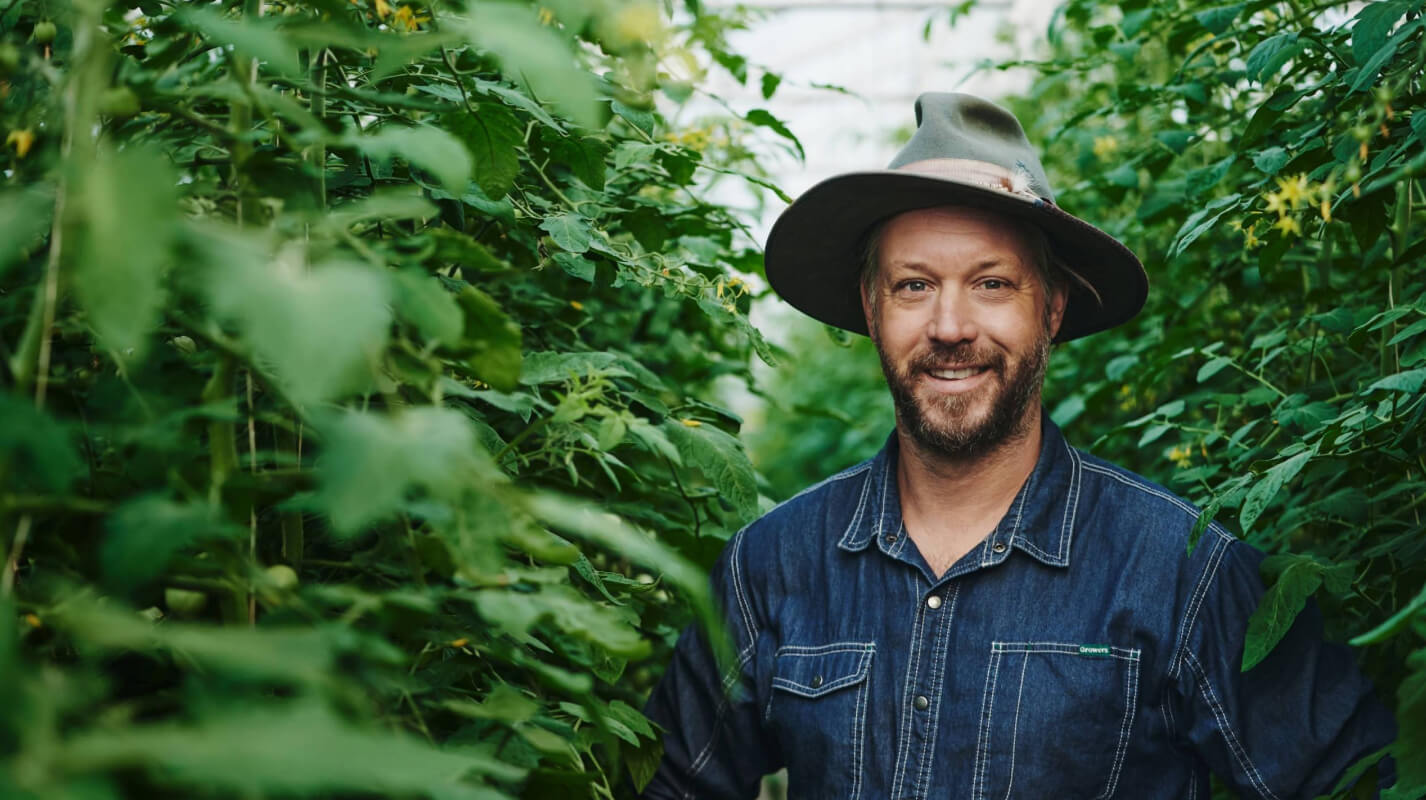Home > Season Extension & Winter Farming Strategies
Season Extension & Winter Farming Strategies
Grow and harvest fresh veggies all year round
Season Extension & Winter Farming Strategies
Grow and harvest fresh veggies all year round
Produce crops outside of their normal season to diversify your revenue streams
Enhance your income with frost hardy vegetables
Promote sustainability and resilience in the food system.
Maximize greenhouse profitability throughout the entire year.
This course not only focuses on the essential principles and fundamentals to reshape your farming practices for the colder months but also emphasizes the importance of food sovereignty and local food production.
Why use season extension & winter farming strategies?
STAND OUT FROM COMPETITORS
Harvest fresh produce over a longer period to extend your CSA basket season and provide a wider variety of crops
GET A HIGHER
SUCCESS RATE
Overcome the obstacles posed by lower temperatures and limited light availability by implementing season extension strategies and frost-resistant veggies
Increase your
revenues
Extend your growing season and boost farm revenue outside of the normal season by optimizing your farming equipments such as tunnels
PARTICIPATE TO FOOD SOVEREIGNTY
Grow a loyal customer base by providing them with locally fresh, and organic produce year-round
Who is this course for?
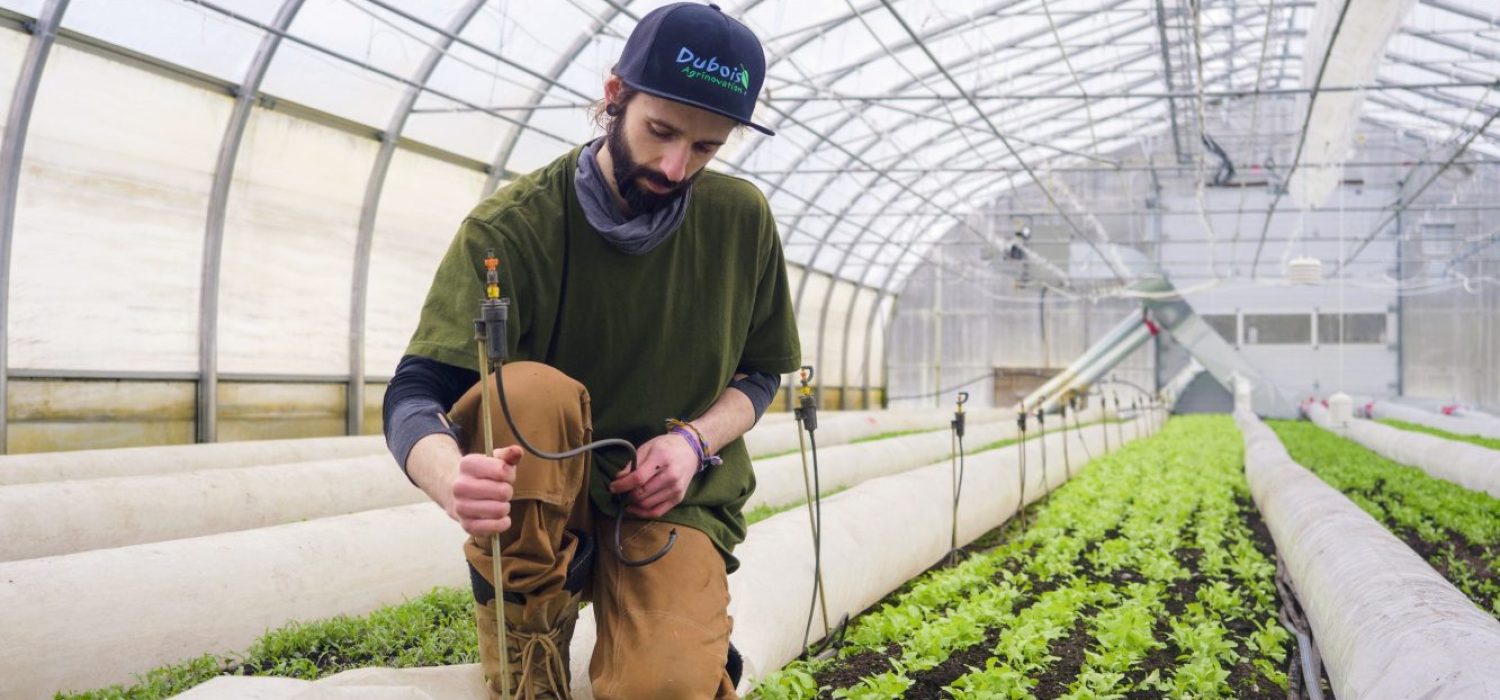
Committed gardeners who need guidance to implement different strategies to harvest crops all year round
Growers who want to extend their production season for additional income
Established producers who wish to stand out in markets and increase the diversity of your offer, resulting in increased customer loyalty
How does it work?

This online course provides precise written and video instruction, to give you the exact methodology, tools and techniques needed to grow crops successfully in a context of heightened efficiency.
ENGAGING VIDEO
TUTORIALS
DETAILED
TECHNICAL SHEETS
Produced in collaboration with
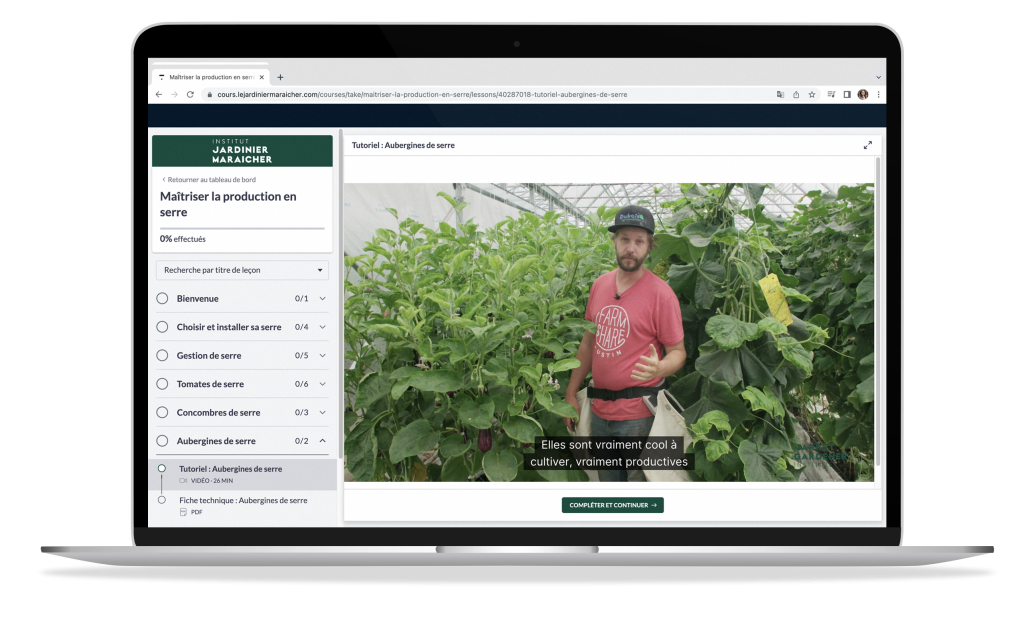
Get started with our free preview!
Want to have a sneak peek of the course?
You have the opportunity to preview a free lesson from the course to see if it meets your needs. In this overview, you’ll get an introduction to winter farming principles.
You could win a Caterpillar Tunnel!
In collaboration with our partner Tessier Greenhouse, we’re offering an exclusive contest for all new students who register for the course by September 26. 🎉
What’s at stake? A caterpillar tunnel worth $3,320USD
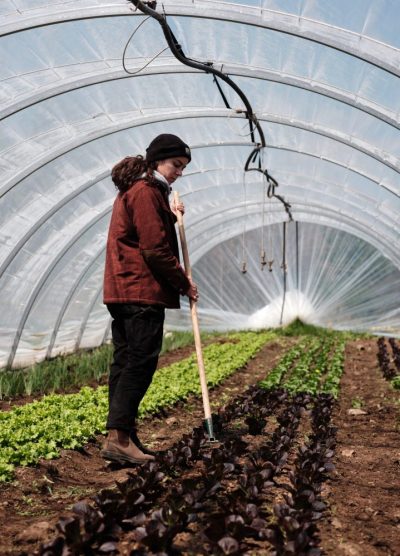
Meet your teacher
JM Fortier
Since launching his bestseller book “The Market Gardener, A Successful Grower’s Handbook for Small-Scale Organic Farming” in 2012, JM Fortier has been internationally recognized as a foremost expert in the field of biointensive farming and has spoken at hundreds of conferences, keynote addresses, and training sessions, becoming an inspiration for farmers worldwide.
JM is also the author of “The Winter Market Gardening“, a book dedicated to winter crops. This publication has been adapted for three specific markets to reflect the different climatic realities of northern regions. With over ten years of practical experience in winter growing, his ideas are firmly rooted in concrete, proven knowledge.
His current mission is to pass on this knowledge to thousands of farmers through his work at the Market Gardener Institute.
Based on the techniques shown in this book
The Winter Market Gardener
Many small farms shut down during the dark winter months. Yet with the right techniques, equipment, and cultivars, year-round growing can produce the highest quality and tastiest fresh local vegetables, all while banking a profit.
Building on years of research, experimentation, and collaboration, The Winter Market Gardener is a beautifully illustrated practical guide to winter vegetable production for small farmers growing in northern climates.
Meet our partner
Tessier
Tessier is a 40 years of experience manufacturer and installer of greenhouses and caterpillar tunnels. Renowned for their solid and high-quality products, Tessier’s experts are particularly appreciated for their guidance role throughout every project.
From greenhouse structures to retractable-roof systems, adjustable grow tables, ventilation and plastic films, Tessier ensures every product has been designed for your needs.
It could be you!
When you do the work and stay committed, the results you can create are extraordinary. Just imagine the growth you’ll experience with the right training, guidance, and support.
Don’t just take our word for it, see how our course changed the farming journey of hundreds of growers.
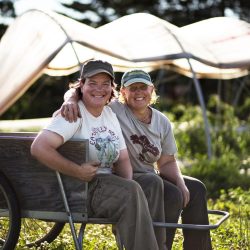
“We have learned about tools and techniques that have made farming more efficient and more sustainable environmentally, financially and physically too!”
— Amy Smith & Verena Varga, Heart Beet Organics, Canada
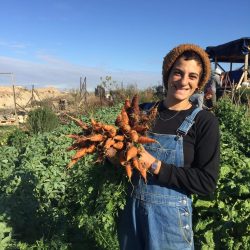
“You can find so much information on the internet; there are so many resources it’s hard to know what to trust. I like having an all-in-one place for referencing detailed strategies that have been tested and tried for others to review and put into practice – it really helps!”
— Yara Dowani, Om Sleiman Farm, Palestine”
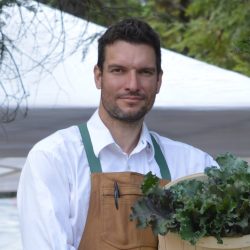
“Everything I learned about growing vegetables comes 100% from JM Fortier. Everything grows to perfection, and our clients are extremely happy.”
— Alexandre L’Heureux, The Happy Farm, Canada
How much does it cost ?
Our winter growing course provides precise written and video instruction, to give you the exact methodology, tools and techniques needed to grow crops successfully in a context of heightened efficiency.
Safe payment with Stripe or Paypal
What is inside?
Welcome
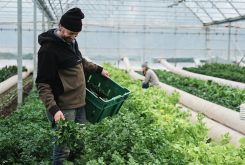
In this short video, you’ll get a quick overview of the key learnings and insights from JM Fortier’s 20+ years of experience as a successful market gardener.
Module content
- Tutorial: Welcome
Introduction to Season Extension Strategies
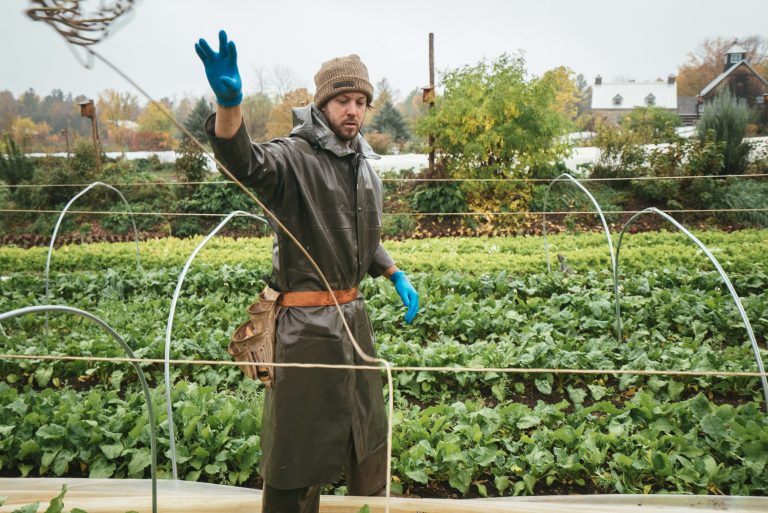
In this video, you’ll get insights from JM Fortier’s 20+ years of experience as a successful market gardener. He’ll present you an overview of season extension challenges and strategies to overcome them.
Module content
- Tutorial: Intro to Season Extension Strategies
- Technical Sheet: Intro to Season Extension Strategies
- Technical Sheet: Intro to Bio-intensive Agriculture
Caterpillar Tunnels
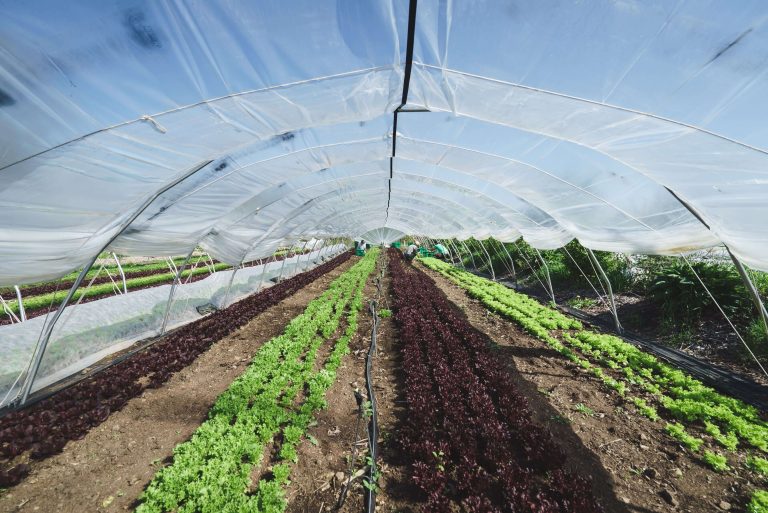
Caterpillar Tunnels are an impressive season extension strategy for their cost. In order to get the most value out of them, here you’ll discover how to build them securely and efficiently. JM demonstrates how to do so with the gothic and the standard types of caterpillar tunnels.
Module content
- Tutorial: Building a Gothic Caterpillar Tunnel
- Technical Sheet: Building a Gothic Caterpillar Tunnel
- Tutorial: Building a Caterpillar Tunnel
- Technical Sheet: Building a Caterpillar Tunnel
Small and Micro Tunnel
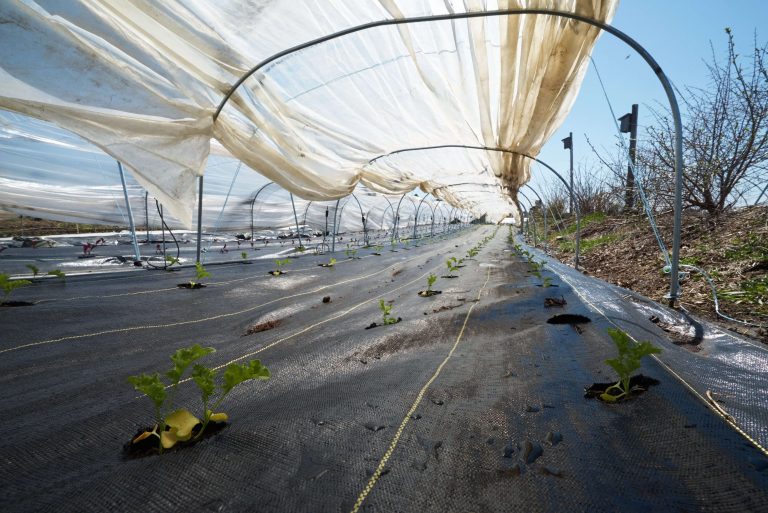
Small and Micro tunnels are low-cost, easy, and quick-to-build solutions to season extension. They cover 1 or 2 beds and they are very mobile. Small and very small farms will love it!
Module content
- Tutorial: Building a Small Tunnel
- Technical Sheet: Building a Small Tunnel
- Tutorial: Building a Micro-Tunnel
- Technical Sheet Building a Micro-Tunnel
Row Covers and Tarps
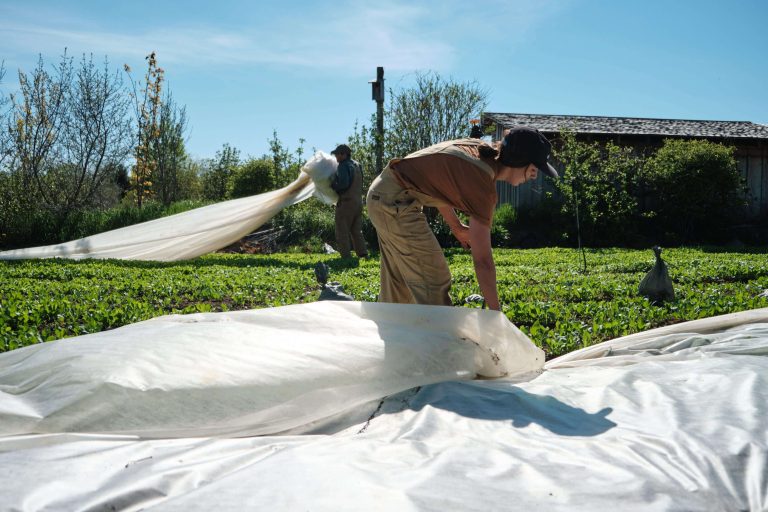
Those equipment is a simple solution that is really affordable. Discover how row covers are the most adaptive season extension strategy. The module also gives useful insights on how to use black tarps and clear plastic to get early plantings during spring.
Module content
- Tutorial: Row Covers
- Technical Sheet: Row Cover
- Tutorial: Tarping for Early Spring Planting
- Technical Sheet: Tarping for Early Spring Planting
Shelter Management
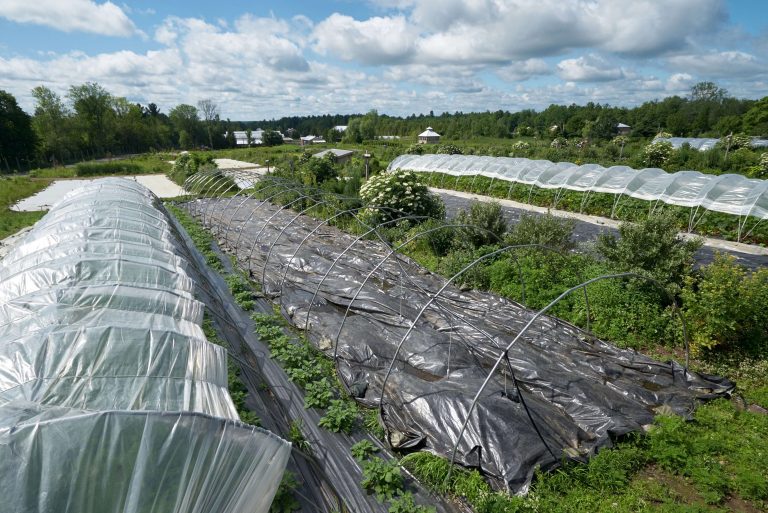
In this module, you’ll understand how to manage those different crop sheltering strategies. A comparative chart of each shelter will help to give you an overview of the different crop shelters and to better understand which solution is the best for you.
Module content
- Technical Sheet: How to Manage Crop Shelters
- Chart: Season Extension Shelters
Introduction to Winter Farming Principles
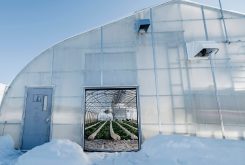
The following guiding principles will provide guidance on how to successfully grow vegetables that are well-adapted to winter growing conditions.
Module content
- Tutorial: Introduction to Winter Growing Principles
- Technical Sheet: Introduction to Winter Growing Principles
Winter Farming Practices
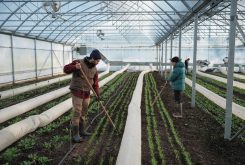
This module covers topics as varied as climate control, the use of row covers, crop planning, cultivars, irrigation, fertilization, weeding and harvesting. All adapted to the particular context of winter!
Module content
- Tutorial: Winter Growing Practices - Part 1
- Tutorial: Winter Growing Practices - Part 2
- Technical Sheet: Winter Growing Practices
Celery (Cut-and-Come-Again)
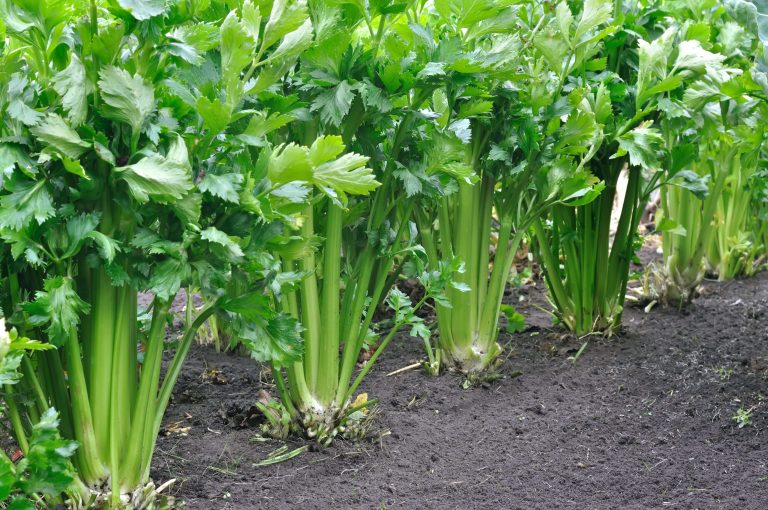
Module content
- Tutorial: Celery (Cut-and-Come-Again)
- Technical Sheet: Celery (Cut-and-Come-Again)
Dill & Coriander
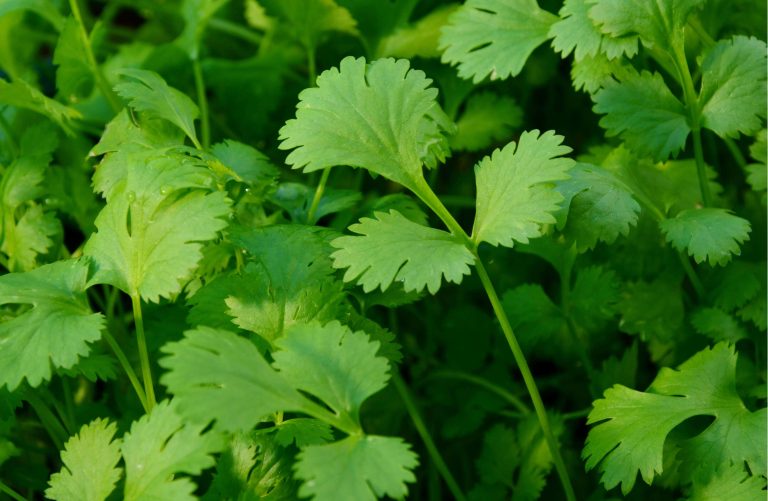
With these two, you’ll be able to offer herbs to your customers when the temperature is getting low. Even if you are out of the high season, it doesn’t mean you can’t add nice flavor and perfume to your offering!
Module content
- Tutorial: Dill & Coriander
- Technical Sheet: Dill & Coriander
Green Onions
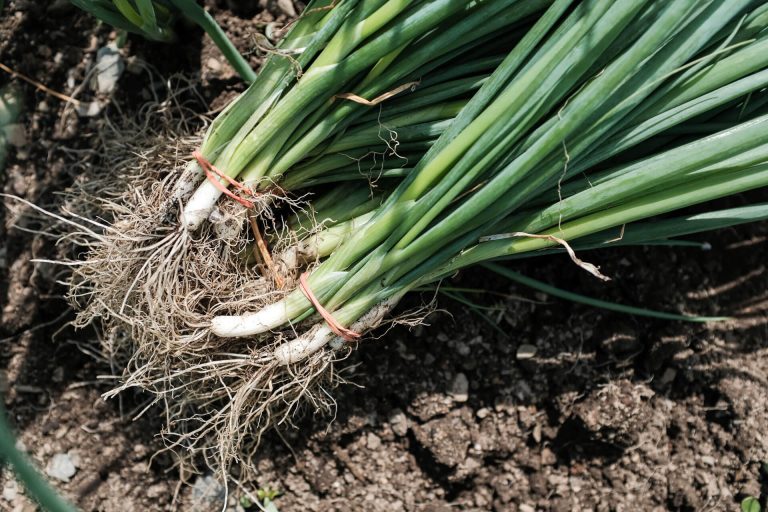
Green onions_season extension_farming course
[P] Green onions are a very nice season extension crop. First, because they are very cold tolerant, but also because they are quite fast to grow. In addition, they allow you to have a crop from the onion family very soon and late in the season. All this makes this crop a profitable one to add to your offering.
Module content
- Tutorial: Green onions
- Technical Sheet: Green onions
Spinach
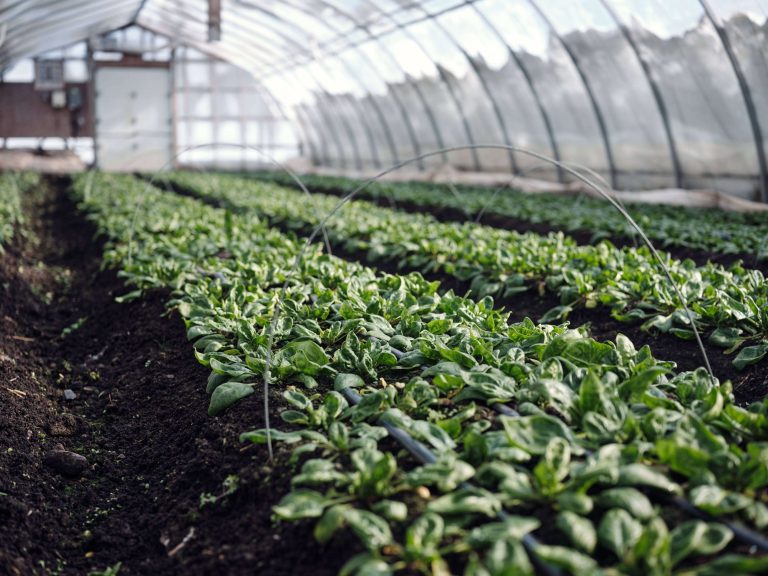
Spinach is such an amazing crop for season extension because it can withstand heavy frosts. They also provide fresh greens during the shoulder and low seasons. Spinach offers a nice yield even in low temperatures, which makes it a profitable season extension crop.
Module content
- Tutorial: Spinach
- Technical Sheet: Spinach
Swiss Chard
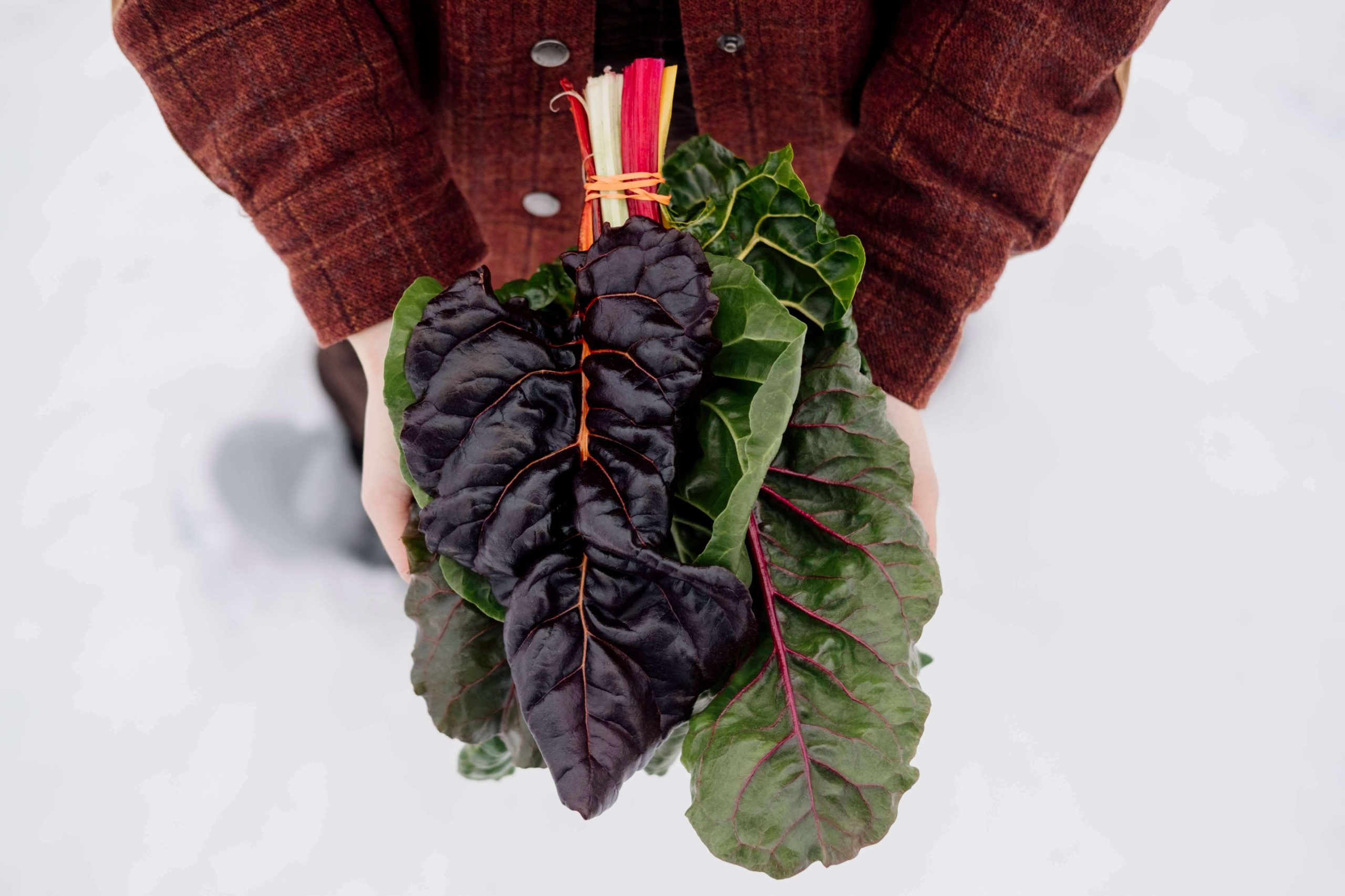
Pushing swiss chard further into the season is a great way to have both fresh and colorful greens. Once they are established, they are pretty resistant to cold temperatures. Your clients will love those nutritious bunches of colorful stems and leaves! As swiss chard is susceptible to boron deficiencies, we added a boron application
Module content
- Tutorial: Swiss Chard
- Technical Sheet: Swiss Chard
- Chart: Boron Application
Winter Arugula
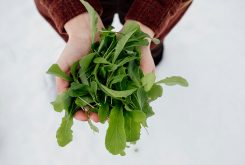
Arugula is one of our favorite winter crops because of its ability to regrow and produce several quality yields, even in cold weather. To successfully grow this vegetable in the winter, be sure to adjust spacing to maximize its access to light, and provide minimal heating to avoid losing crops on very cold nights.
Module content
- Tutorial: Winter Arugula
- Technical Sheet: Winter Arugula
Winter Bok Choy
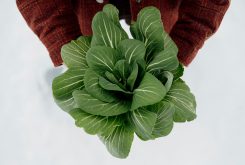
Bok choy is an easy to grow Asian vegetable that is popular with both market and restaurant customers. Bok choy grows quickly and requires little maintenance, which makes it a fairly profitable crop when done well.
Module content
- Technical Sheet: Winter Bok
Winter Kale
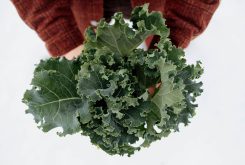
Kale is an excellent crop to grow in winter. It is very cold hardy and resistant to fungal diseases, making it an easy crop to grow successfully even during the coldest months of the year. Winter kale is more tender and sweeter than the one grown in summer. It is a very popular product with consumers.
Module content
- Tutorial: Winter Kale
- Technical Sheet: Winter Kale
Winter Mesclun
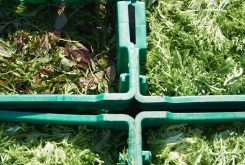
Mesclun is an ideal winter crop because it offers a lot of flexibility. Our winter greens mix changes weekly depending on which beds are ready for harvest. The important thing is to create a beautiful mix of flavors, textures and color.
Module content
- Tutorial: Winter Mesclun
- Technical Sheet: Winter Mesclun
“The future of a sustainable agricultural system lays in the art of growing off-season”
Follow JM’s complete tried and true methodology for growing high-quality crops in a context of heightened efficiency.
Safe payment with Stripe or Paypal
Stay in the loop!
Join our mailing list to get exclusive content and invitations from the Market Gardener Institute.
Frequently Asked Questions
Tell me more about the course
What will I learn?
Growing in a cold region during winter presents many challenges in terms of low light levels, snow accumulation and recurrent heavy frosts. The Winter Farming Strategies course presents different techniques and principles to overcome these challenges and grow the best winter crops. It will help you increase your winter income with the help of tutorials and technical sheets. They will provide you with important information about building crop shelters, winter crop planning, crop densities, weeding, fertilizing and harvesting.
What will I learn?
Growing in a cold region during winter presents many challenges in terms of low light levels, snow accumulation and recurrent heavy frosts. The Winter Farming Strategies course presents different techniques and principles to overcome these challenges and grow the best winter crops. It will help you increase your winter income with the help of tutorials and technical sheets. They will provide you with important information about building crop shelters, winter crop planning, crop densities, weeding, fertilizing and harvesting.
What is included in this course?
This course allows you to master the methodology, tools, and techniques to successfully grow field crops early and late in the season, all adapted to the context of regenerative micro-farming. Each module includes video tutorials and downloadable technical sheets. Each video tutorial and technical sheet will give you in-depth step-by-step, yet straightforward instructions covering every stage of production, from seed to storage.
Each technical sheet will give you :
- Crop info and the best cultivars to grow
- Crop planning guidelines
- Starting seeds
- Spacing requirements
- Fertilization recommendation
- Irrigation type and management
- Implantation equipment and detailed itinerary
- Weeding and maintenance instructions
- Plant protection best practices
- Best harvesting techniques
- Conditioning and storage instructions
What is the difference between the Winter Farming Strategies course and the Masterclass?
Our course is a technical program focused on winter farming strategies This does not cover working with living soil, whole season crop planning, field irrigation, in-depth tools instructions, cover crops, in-depth pest management, in-depth washing and conditioning techniques and tools, and technical itineraries for about 40 crops. Please note that all of the content for this course is available in our signature Market Gardener Masterclass, so with the purchase of the course Winter Farming Strategies, you get a 10% discount
Where do the courses take place?
Everything is online — no travel is required. You can go through the training at your own pace. Of course, the real test is in how you apply this education to your own farm or market garden.
How much time do I need to commit?
The course requires approximately 5 hours to complete if done linearly. The real-time investment will be in implementing your learning in your farm project.
When are the registration periods?
All our on-demand courses are accessible anytime.
Which devices can I use to access the program?
After registering for the program, you will be prompted to create a user profile for accessing the training platform. You will then be able to take the course on any device connected to the Internet. Please note that you can only access our courses from one device at a time, whether it’s your smartphone, tablet, laptop, or desktop computer.
You need to have a broadband internet connection with a minimum speed of 5Mbps.
In which languages do you offer the program?
Our on-demand courses are offered in English and French. All documents and text are offered in the language of your initial purchase. French speakers, please note that our videos are in English with French subtitles.
Does it replace practical experience?
No. Our courses are designed to help people with real-life farming and gardening experience take their operations to the next professional level. Some of our students are just starting out, while others have a few growing seasons under their belts; some have been farming for decades — most have said that using our program has made a big difference in their business’ success.
Other questions?
Will the methods work in my climate?
Every situation is different, including climate, terrain, soil, markets, and more. While our methods are designed for vegetable production in temperate climates, from Mongolia to Argentina, we have students successfully applying our methods all over the world. Being a great farmer, knowing your crops thoroughly, and optimizing your production to be more efficient applies everywhere on the planet.
What payment methods are accepted?
We accept all major credit cards including Visa, Mastercard, Discover, and American Express.
What if I have more questions?
If you have any questions or concerns, please do not hesitate to contact us. We are always happy to help you.
